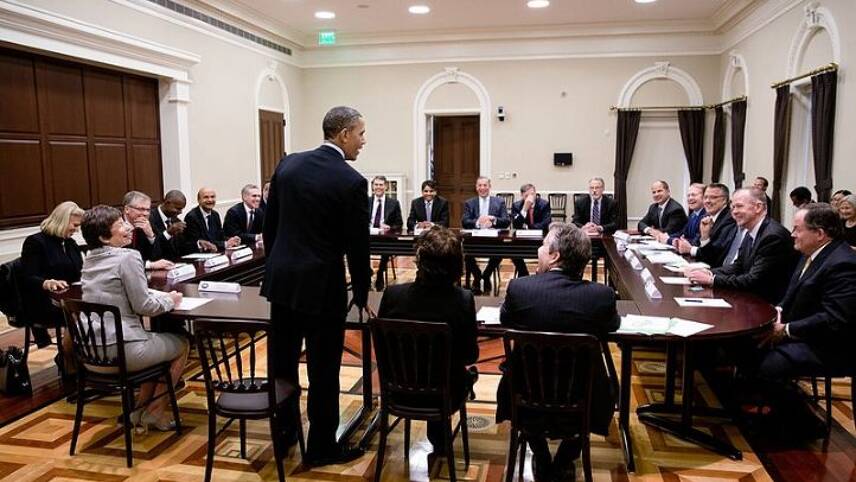Register for free and continue reading
Join our growing army of changemakers and get unlimited access to our premium content

Pictured: Members of the Business Roundtable meeting with then-president Barack Obama in 2013. Image: Pete Souza for the White House
The call to action was made on Monday (19 August) in a new statement from the Business Roundtable – a collaborative, US-based organisation with 192 members, hailing from all major sectors and covering all states.
Members of the Business Roundtable collectively control more than $7trn in annual revenues, with their companies covering more than 15 million employees in the US and beyond.
The new statement, which aims to define “the purpose of a corporation”, states that the maximisation of profits for shareholders will no longer be sufficient for big business of the future to meet the demands of society, investors or the workforce.
Instead, it argued that corporates wishing to remain relevant in years to come must be “meeting or exceeding customer expectations”; “investing in employees,” including by “compensating them fairly and providing important benefits,” as well as offering training and education so that they can “develop new skills for a rapidly changing world”; “dealing fairly and ethically with our suppliers”; “supporting the communities in which we work”; and “generating long-term value for shareholders.”
JPMorgan Chase’s chief executive Jamie Dimon, who chairs the Business Roundtable, said the declaration “will help to set a new standard for corporate leadership”.
The new statement was signed by representatives from 181 of the Roundtable’s 192 members. Those that did not sign, the organisation insist, are currently unable to do so because an interim chief executive is in place or because the company is otherwise transitioning between leaders.
Signatories include the likes of The Coca-Cola Company, PepsiCo, Procter & Gamble (P&G) and Johnson & Johnson from the consumer goods space; FedEX, UPS, American Airlines and General motors in the transport industry; retail giants Walmart, Macy’s and Walgreens Boots Alliance; and professional service firms EY and Deloitte.
As a first step, signatories have committed to deliver long-term value to their customers, employees, suppliers and local communities.
Reaction
The Ford Foundation’s president Darren Walker, like many others from across the US economy, has hailed the new statement as “tremendous news”.
“It is more critical than ever that businesses in the 21st century are focused on generating long-term value for all stakeholders and addressing the challenges we face, which will result in shared prosperity and sustainability for both business and society,” Walker said.
Walker’s sentiments come at a time when research is repeatedly suggesting that Millennials and Gen Z will not buy from, invest in, or work for, corporates whose values or practices go against their own personal ethics. Communications agency FleishmanHillard Fishburn (FHF), for example, found that 93% of the millennial generation want to buy from companies that have purpose, sustainability and environmental stewardship built into their ethos. The findings echo those of Deloitte, which revealed in 2016 that 56% of millennials will exclude companies that are not operating sustainably from their shopping lists, while 49% will refuse to work for companies that go against their personal ethics.
Moreover, the declaration comes as many of those vying for Presidency in the US in 2020 are touting a Green New Deal in an attempt to win votes. Such a policy framework aims to deliver economic prosperity by placing society and the environment at the heart of economics.
Nonetheless, questions have been raised as to whether the new statement is a genuine sign of business transformation – or simply a greenwashing tactic to allow big companies to carry on with business-as-usual while claiming they are not.
Sarah George


Please login or Register to leave a comment.